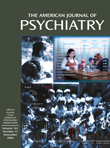Malnutrition at Age 3 Years and Externalizing Behavior Problems at Ages 8, 11, and 17 Years
Abstract
OBJECTIVE: Poor nutrition is thought to predispose to externalizing behavior problems, but to date there appear to have been no prospective longitudinal studies testing this hypothesis. This study assessed whether 1) poor nutrition at age 3 years predisposes to antisocial behavior at ages 8, 11, and 17 years, 2) such relationships are independent of psychosocial adversity, and 3) IQ mediates the relationship between nutrition and externalizing behavior problems. METHOD: The participants were drawn from a birth cohort (N=1,795) in whom signs of malnutrition were assessed at age 3 years, cognitive measures were assessed at ages 3 and 11 years, and antisocial, aggressive, and hyperactive behavior was assessed at ages 8, 11, and 17 years. RESULTS: In relation to comparison subjects (N=1,206), the children with malnutrition signs at age 3 years (N=353) were more aggressive or hyperactive at age 8 years, had more externalizing problems at age 11, and had greater conduct disorder and excessive motor activity at age 17. The results were independent of psychosocial adversity and were not moderated by gender. There was a dose-response relationship between degree of malnutrition and degree of externalizing behavior at ages 8 and 17. Low IQ mediated the link between malnutrition and externalizing behavior at ages 8 and 11. CONCLUSIONS: These results indicate that malnutrition predisposes to neurocognitive deficits, which in turn predispose to persistent externalizing behavior problems throughout childhood and adolescence. The findings suggest that reducing early malnutrition may help reduce later antisocial and aggressive behavior.



